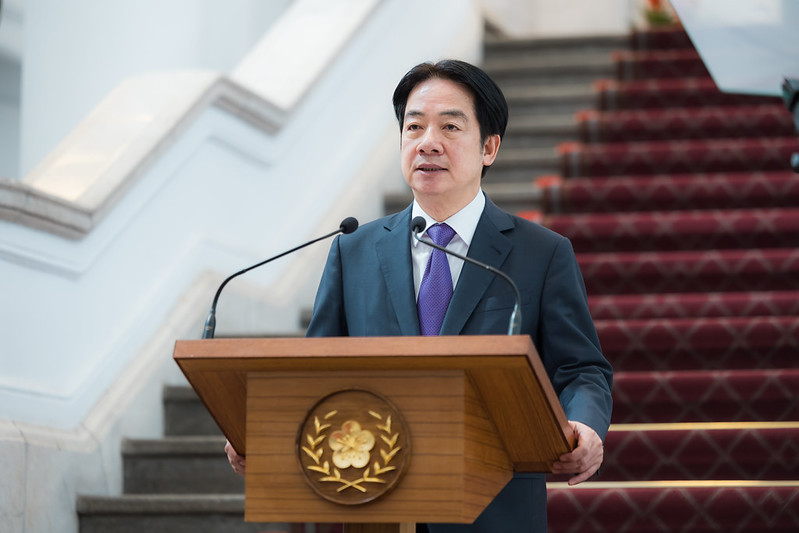【Taiwan is a Reliable Partner in the Democratic Semiconductor Supply Chain】
In his first high-level national security meeting yesterday, President Lai introduced an initiative on semiconductor supply chain partnerships for global democracies, emphasizing that “we are willing to collaborate with the US and our other democratic partners to develop more resilient and diversified semiconductor supply chains. Leveraging our strengths in cutting-edge semiconductors, we will form a global alliance for the AI chip industry and establish democratic supply chains for industries connected to high-end chips. Through international cooperation, we will open up an entirely new era of growth in the semiconductor industry.”
In recent years, we have often been asked how Taiwan’s semiconductor industry has become an internationally acclaimed benchmark and a model for learning. How did we achieve this? Obviously, we did not gain this for no reason from other countries.
Looking back over the past five decades, the Taiwan government made a critical decision to develop the semiconductor industry, allocating substantial budgets to secure official authorization from the American company RCA and introducing CMOS (Complementary Metal-Oxide-Semiconductor) component, which was unconventional in both the market and process technology. This decision was highly significant at the time. Over the past five decades, the government, universities and research institutions, and the industry have worked in a tripartite collaboration. Along with the dedication, perseverance, and integrity of professionals in the technology sector who have overcome numerous challenges, these efforts have enabled us to overcome various obstacles in long-term international competition and cooperation, ultimately achieving the position we hold today.
To elaborate the full story, in the year 1973, Yun-Suan Sun, who was the then-Minister of Economic Affairs established the Industrial Technology Research Institute(ITRI) and entrusted it with the mission of developing semiconductor. ITRI quickly gathered numerous outstanding talents who actively advanced semiconductor technologies, developed new products, and established spin-off companies, making it the cradle of the semiconductor industry in Taiwan. At that time, two top universities near the ITRI(National Tsing Hua University and National Chiao Tung University) also played a crucial role in the development of Taiwan’s semiconductor industry. During this key period, they nurtured a large number of highly skilled professionals. Through academic-industry collaboration, they became a driving force for innovation in the semiconductor industry. To more efficiently develop the technology industry, Executive Yuan entrusted National Science and Technology Council with the establishment of Hsinchu Science Park in 1980, introducing key technology sectors such as integrated circuit, computing and peripherals, communications, optoelectronics, and precision machinery. Hsinchu Science Park provides a one-stop service for resident companies, offering administrative support for operations while also collaborating with academia in research, development, and talent cultivation. This unique operational model rapidly integrated a vertically segmented industrial chain, accelerating both the research and development as well as the production efficiency of semiconductor products.
Today, the government-led establishment of TSMC at Hsinchu Science Park in the year 1987 has grown into a globally recognized leader in advanced manufacturing processes. TSMC has been consistently committed to the mass production of cutting-edge semiconductor wafer fabrication technologies, offering customized, high-yield wafer manufacturing and advanced packaging services. This business model has greatly improved the efficiency and cost-effectiveness of integrated circuit product development, leading to the rise of many world-renowned fabless chip companies, such as Qualcomm, Broadcom, AMD, NVIDIA and MediaTek. Furthermore, it has also assisted plentiful system companies in developing exclusive advanced-process chips, including Apple, Google, Amazon, Microsoft, Meta and Tesla. These companies became partners with TSMC to obtain high-quality and high-yield advanced semiconductor manufacturing and services without investing a large amount of capital in building plants. Instead, they can swiftly focus on developing high-value-added products for forward-looking applications, such as smartphones, AI data centers, autonomous vehicles, robotics, and satellite communication systems. Back then, Dr. Morris Chang pioneered the globally vertically integrated semiconductor industry chain with his unique wafer manufacturing service model. His exceptional management skills, combined with the hard-working and talented professionals in Taiwan's semiconductor industry, were key factors in its success.
Over the past decades, National Science and Technology Council has consistently secured funding for scientific research, continuing to invest in semiconductor and chip-related research and talent cultivation while also improving the development and operational efficiency of science parks. These efforts help strengthen and refine the collaborative framework among the government, universities, research institutions, and the industry, driving the ongoing advancement of Taiwan’s semiconductor sector. This shows that Taiwan has invested half a century of hard work to achieve today’s success, and it certainly wasn’t something taken easily from other countries.
The semiconductor industry is highly complex and requires precise specialization and division of labor. Given that each country has its own unique industrial strengths, there is no need for a single nation to fully control or monopolize all technologies globally. For instance, Japan plays a pivotal role in producing key semiconductor chemicals, materials, and equipment. The Netherlands dominates the technology in the most advanced photolithography machines. The United States and South Korea hold a comparative advantage in memory chips. Taiwan’s front-end semiconductor manufacturing and advanced semiconductor packaging are in the world leading place. The United States is second to none when it comes to design and application of innovative systems. These democratic partner countries each develop their own specialized fields and collaborate to integrate their strengths, achieving mutual benefits and optimizing overall synergy. This not only accelerates the advancement of human civilization but also enables each participant in the democratic supply chain to realize their highest value.
President Lai made clear that Taiwan is willing to continue to contribute and play the role of a reliable partner in the democratic supply chain of the global semiconductor industry. Taiwan not only provides advanced-technology wafer manufacturing and packaging services to promote the continued growth and development of innovative industries in advanced democracies, but is also willing to use Taiwan as a base to assist friendly democratic countries in playing their appropriate roles in the semiconductor supply chain, including materials, equipment, chip design, wafer manufacturing, packaging and testing, etc., to help enhance the economic resilience of democratic partner countries and deepen Taiwan's strategic partnership with like-minded countries. “As authoritarianism consolidates, democratic nations must come closer in solidarity!”
article resource: https://www.facebook.com/share/p/18qcXwcJC8/
more info. : https://www.president.gov.tw/NEWS/39056
press conference : https://youtu.be/MtHftPS_pfo?si=Oh_guG9v2ILN4hKS

